On April 7, Shanghai University of Finance and Economics hosted a conference titled “international economics cooperation trend and choice” plus the renaming ceremony of the Institute of International Economics Cooperation held in the technology park. It was undertaken by the Collage of Business and Shanghai World Economics Association. The Standing Committee Member of the Communist Party and Vice Principal of the university Professor Xinyuan Chen and COB Associate Executive Dean Hang Wei attended this event together with experts and scholars of the universities from home and abroad. This conference was divided into two parts like the renaming ceremony and high-end scholars forum.
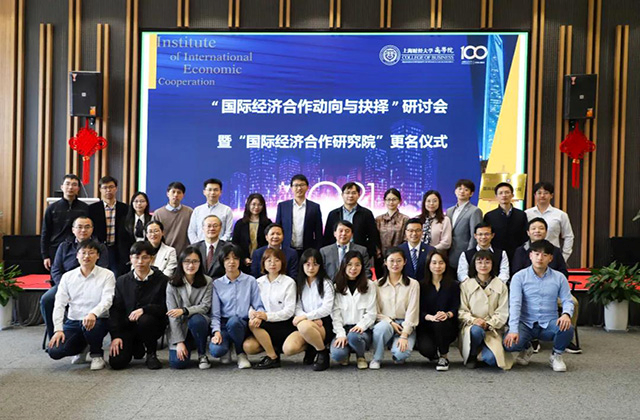
On the high-end scholar forum, experts deliver speeches on various topics like the current world economy, the Sino-US relationship, the internationalization of RMB, and the transformation of international trade patterns. The Assistant Dean of the College of Business Studies of Shanghai University of Finance and Economics and Associate Professor Haoyuan Ding of the Department of World Trade and Economy chairs the forum afternoon.
Jiadong Tong, Professor of the Departments of Economic from Nankai University made a speech on “the increased strategic competition and challenge between China and US”. Linking the current international situation and rich academic research, Professor Tong analyzed the focused influence of Chinese companies in the US. He showed the real preferences made by American enterprises based on the theories of the emergence of the Sino-US strategic competition and current limitations of the US. Professors produced conclusions and countermeasures as follows:
At the beginning, the Sino-US competition remains a strategic race because of the rise of China and the competition would be long-term covering comprehensive power
Second, two parties in the US have established a consensus to fight against China and it is a trend hard to change
Third, the policy of American enterprises would represent the key agenda to decouple the two economies and Sino-US trade and investment
Fourth, strengthening relationship with other countries would get a plan to prevent the success of the US strategy and China have to expand its international collaboration.
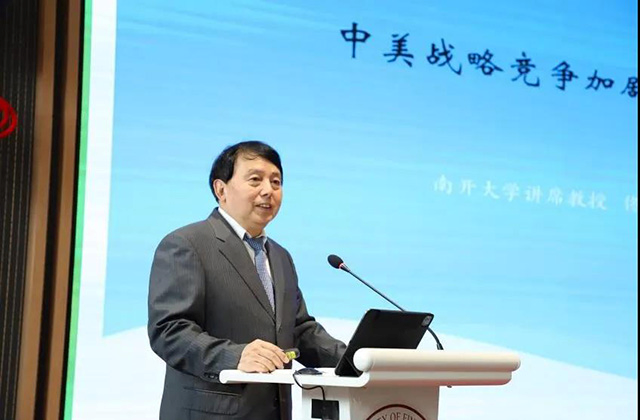
The Dean of the Smart Finance Institute of Hengqin New District, Zhuhai and the Hengqin Finance Research Institute of Jilin University, Professor Xiao Li delivered a speech titled “the essence of game between China and US attend a race to reform that derived from three thoughts on the transformation of international relations in the recent order”.
First, the expansion of leading parties in international relations has face foreign relations of dominant states with contemporary challenges; Second, the deeper a country is integrated into international relation network, the more its national interest is internationally socialized; Third, political cooperation among major countries constitute a key foundation to the steady development of world economy. Professor Li restated that the essence of the game between China and the US represents a race of reform, where the two countries go in pursuit of a consensus to a larger extent based on mutual respect. This is significantly meaningful to both world economy and social development.
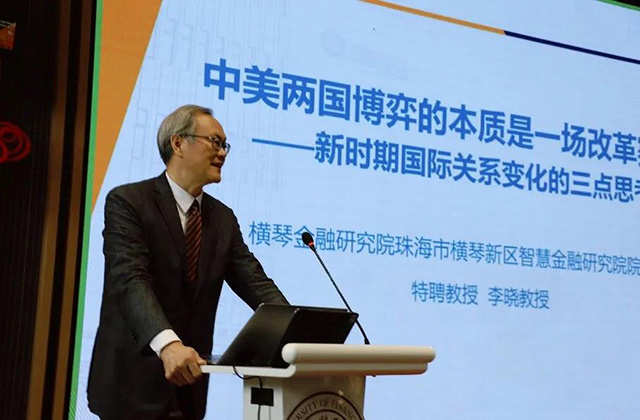
Professor Guoqiang Tian from A&M University of Texas made a speech titled “constructing a new pattern of high-end international development and its strategic choices”. Professor Tian’s opined that the world currently is in a shifting pattern that has not happened merely in a century, and Covid-19 is accelerating the change. The social and economic development of China is facing hefty risks from external parties like comprehensive strategic competition between China and US with regard to geopolitics and economy, trade protectionism, anti-globalization and spillover effect of ultra-loose policy adopted by developed economies. To cope the future, China needs to further open itself up to the external world in an all-round way, deepen high-level international economic cooperation and developed a favorable international environment to establish a new pattern of domestic and international development. Focusing on the construction of a contemporary high-level international development, it is only an expedient measure to overall opening-up to cope the in china-US relations and their external environment. It is endogenous prerequisite to China’s own reform, development, and modernization.
Professor Zhigang Yuan from the Department of Economics, Fudan University delivered a lecture entitled “Global Macroeconomic Dilemma and the Challenges facing China’s Economy”. Professor Yuan first analyzed the long-term development trend of world economy, and emphatically offered the prediction to the Sino-US relations. He believes that in the long run, the realistic trend of globalization needs to be an emphasis on “Tolerance”. Under the huge changes of the world economy, the global politico-economic structure based on the difference of sovereign states should be the best option for Sino-US relations. After that, Professor Yuan made a judgment on various short-term phenomena of current global economy. He argued that the short-term recovery in the U.S. economy was beneficial, but guided by over-optimistic trends, higher inflation and U.S. bond yields, production has recovered in China, consumption has not completly recovered. At the last moment, Professor Yuan Zhigang also elaborated the consumption, investment, and export challenges faced by Chinese economy.
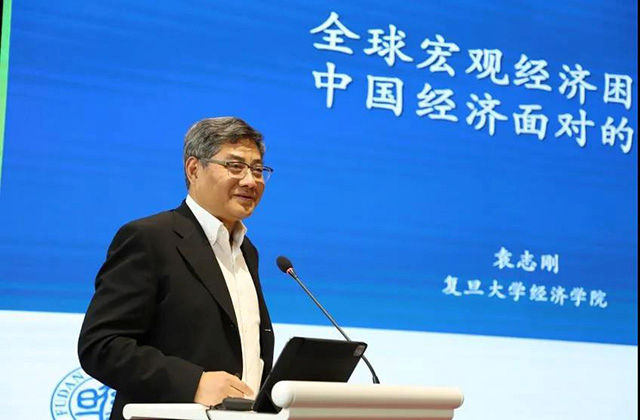
Professor Kees G. Koedijk from CEPR and the College of Business and Economics of Vrije Universiteit and CEPR delivered an online speech on the theme of “Globalization and International Cooperation”. Professor Koedijk first reviewed the history of globalization and its practical effect on economic and social development and analyzed the development course and influence on “Reverse globalization” and “Regionalization”. He pointing out that the trend of globalization is irresistible; International cooperation is critically significant in overcoming global challenges. Professor Koedijk restated the importance of international consensus and multi-dimensional cooperation on how to promote and accelerate the development of globalization . At the last moments, Professor Koedijk proposed CEPR and the vision & direction of the “Global Economic Cooperation Institute”.
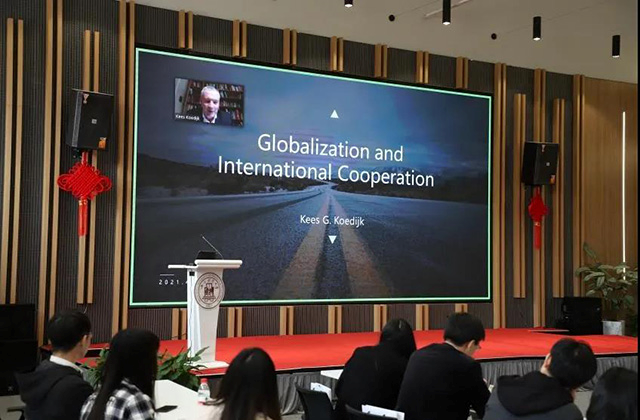
Professor Shu Lin from the Department of Economics of the Chinese University of Hong Kong attended the forum and delivered a presentation entitled “Internationalization of the RMB into a New Stage”. Professor Lin’s report discusses the shift of the world’s economic center from west to east, while economic and financial rules and order are still dominated by the west. Moreover the presentation presents the internationalization of Renminbi’s relevance, opportunities and challenges, and policy recommendations in global perspective.
Professor Lin placed several suggestions:
· To improve the formation mechanism of RMB exchange rate and enhance exchange rate flexibility
· To strengthens the construction of the domestic financial market, cautiously and actively promote the opening of capital account to provide the assets of high-quality and safety
· To strengthen the construction of offshore market;
We have to promote bilateral currency swaps, foster international banks, and improve the construction of the RMB clearing system.
Professor Ninghua Zhong from the School of Economics and Management, Tongji University presented a speech on the theme “The rise of China in the absence of global leadership”. Professor Zhong, first of all, introduced the three major dilemmas in detail experiencing the world: one is global poverty and income distribution; the other is the clash of civilizations; and the third is ecological problems. In the context of America’s global leadership weakness, the situation of these challenges must come from nations so that they can work together to avert the prisoner’s dilemma.
Associate Professor Ye Haichun of The Chinese University of Hong Kong, Shenzhen introduced the comparable studies on the theme of this forum titled “Foreign enterprises and the circulation of external shocks in China”. His study shows China’s economic development and structural transformation has become a potential channel to import external shocks into China upon the rise of foreign-funded enterprises. On one hand, the direct connection between foreign-funded enterprises and external markets makes their operations more vulnerable. On the other hand, the impact of external shocks spilled over into the internal production network through the commercial credit and production market relationship between the foreign-funded enterprises and the domestic enterprises.
Dr. Liang Guoyong, Senior Economist at UNCTAD, delivered a presentation entitled “The World Economy in the post-epidemic era and China’s choice of development path”. Dr Liang Guoyong predicted that the new crown epidemic had a long-lasting negative impact on the world economy, while globalization process may be further weakened. In the light of the current external environment, Liang offered two suggestions: first, to increase the flexibility of China’s economic development model in the context of monetary policy, we should pay attention to the difference of interest rate between deposit-loan and benchmark interest rate among China and other leading economies. Second, we need to improve the external compatibility of China’s economic development model.
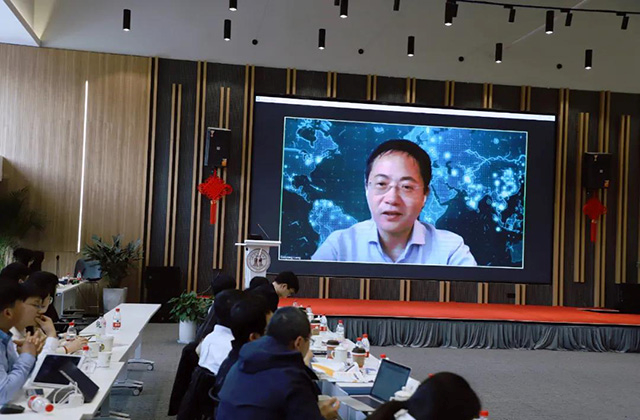
Professor Haichao Fan from the Institute of World Economics at Fudan University, made a presentation entitled “Sino-US trade tariff friction: past, present and future”. Professor Fan Haichao pointed out that the tariff friction between China and the United States is difficult to end in the short term. Due to the impact of the epidemic, the tariff friction has not more considerably worsened, but there is no sign of improvement. As the epidemic in the United States is gradually brought under control, the possibility of tariff escalation friction may create disputes farther between China and the United States. In this regard, Professor Fan put forward three suggestions: first, adhere to the “Double-cycle” strategy: during the period when the Sino-US trade tariff friction is relatively stable, we have to develop the “Inner cycle”, so that it is feasible to calmly deal with the uncertainties of Sino-US trade tariffs in the future; second, we will actively adopt effective measures to conduct consultations and counter-measures, and to focus on cooperation with the middle-high level strategic dialogue. Third, we will add importance to the complementary trade of Chinese and American products enhancing mutual trust and cooperation. This actively build a “Win-win symbiosis” between China and the United States. We have to build great power relations in a complementary and win-win attitude rather than as a competitor.
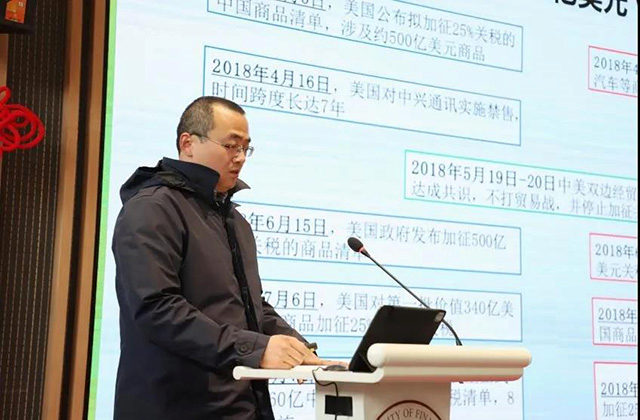
Professor Xiaohua Bao from the College of Business of Shanghai University of Finance and Economics, gave a presentation entitled trends in international trade patterns in the post epidemic era and ways to deal with them. Professor Bao believes that in the post-epidemic era, a series of changes have taken place in the pattern of international trade: after the sub-prime crisis, economic globalization has switched from the era of liberal globalization to the era of regulated, protected and biased globalization. The pattern of global trade network has changed from the core of US, Japan and Germany to the core of US, China and Germany. In this regard, professor Bao recommended policy implications: First, to promote China’s economic globalization from “Away” to “Home” globalization; Second, we will accelerate the mechanism of a “Win-win” free trade area network with China at its cores. Third, we will balance security and openness using “two-dimensional four-quadrant approach” to restructure China’s industrial chain. Fourth, to give to emphasize the Expo events, a unilateral extended platform is needed in the recent situation of the new mission.
In conclusion, Professor Jin Yuying, Executive Director of the Research Institute of International Economic Cooperation of Shanghai University of Finance and Economics, produced a concluding statement, and expressed heartfelt thanks to distinguished speakers for their wisdom, enthusiastic participation, and the hard work. With the support of all circles, the institute is expected to make high-quality research on crucial issues in the areas of international economic cooperation so that they can contribute wisdom and strength to national development.


